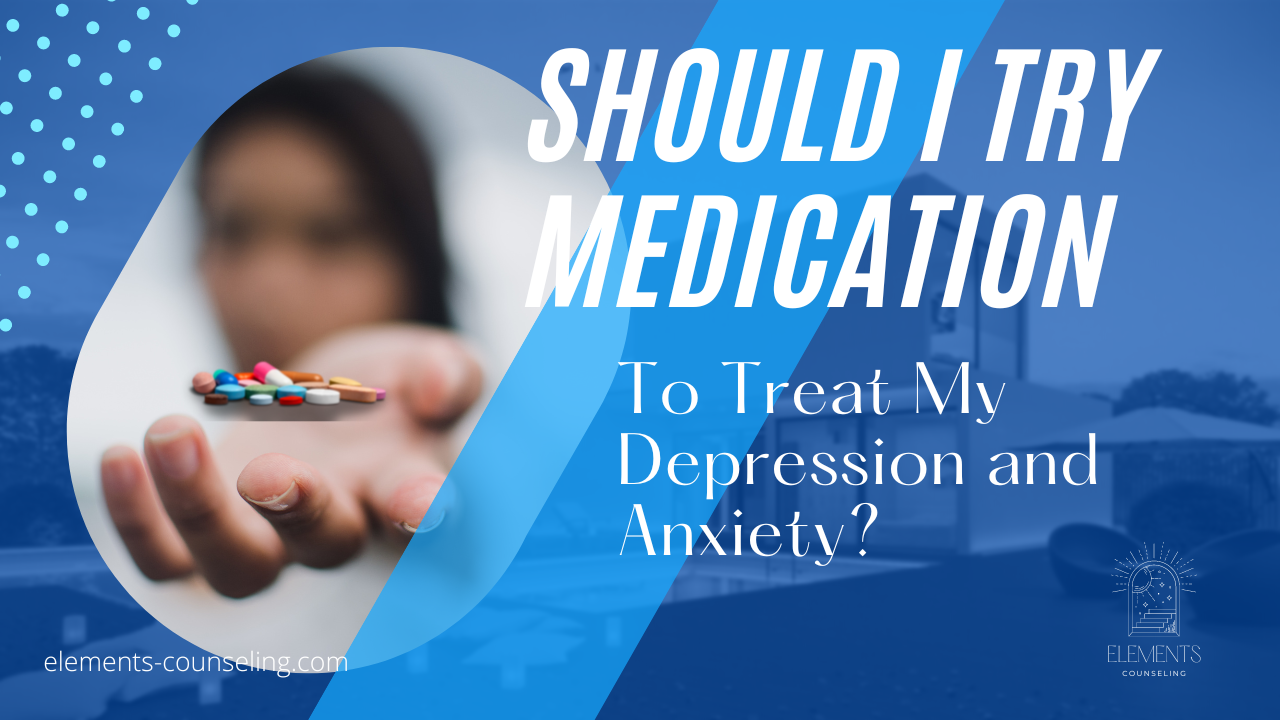 Medications as a treatment option for mental health symptoms is a common question that therapy clients may have. Alternatively, you may be wondering if medications are an option,
Medications as a treatment option for mental health symptoms is a common question that therapy clients may have. Alternatively, you may be wondering if medications are an option,
without going to therapy, and you want to know if it can help.
I am not a prescriber myself, but I have extensive experience working with clients who also takemedications. This article is meant starting point to start your mental wellness journey withmedication. You and your prescriber will decide together what options are right for you.
With that out of the way, let’s get in to some helpful information when the question of using medication to help manage your depression and anxiety (or other symptoms) comes up.
Helps But Does Not Cure 
In the meantime, continuing with therapy can help to manage symptoms as they arise. Once the medication starts working, it will take the edge off of your symptoms and help therapy bemore effective.
As your mood improves, and therapy helps you make changes in your life that can have lasting effects, then you and your doctor may decide that the medications aren’t needed anymore. For many people, this combination is enough to relieve depression, anxiety, and mood, and eventually therapy and medications can come to an end. For others, depression and anxiety may be a life-long struggle and continuing with medications, therapy, or a combination of both, may be the way to get lasting relief. It may take some trial and error to see what is best for you.
Side Effects 
In my experience working with client who would be great candidates for medication, a main
concern are the side effects.
Side effects are non-therapeutic effects of a medication that can be bothersome. They are not
the same as an allergy in that it’s not that the medication isn’t compatible with your body as with an allergy, but that it causes predictable symptoms that don’t help the intended problem, but could create a new one.
Some common side effects are upset stomach, headaches, night sweats, weight gain, sleepiness, and sexual arousal issues to name a few.
There can also be side effects when you stop taking medications. This is called withdrawal. For many of the medications that are used for depression or anxiety, experiencing withdrawal doesn’t mean that you are addicted to the medication, such as with pain killers or alcohol. It means that your body has adjusted to the effects of the medication and has to readjust to not having it.
Most side effects and withdrawal symptoms are mild, and usually go away over time. In addition, many people are so pleased with the relieve that the medication brings, the side effects can be a fair trade off. Although rare, if ever you experience life-threatening side effects, such as chest pain or trouble breathing, seek medical attention immediately.
“Controls”
For garden-variety depression, anxiety and mood struggles, the most common medications are non-addictive and very safe. In my opinion, these should be the first line of medications to try
before trying medications often called “controls”.
Controls are medications that are addictive and can be unsafe and lead to overdose if too many are taken at one time or in combination with other medications. For these reasons, prescribing these medications has extra rules put on it and they are harder to obtain.
Most of the controlled medications I am speaking of are for anxiety, and are probably ones you have already heard of: Valium, Xanax, Klonopin, and Ativan, to name a few. They work quickly, which is an advantage of them, compared to non-habit forming medications.
These medications are used best for acute, or short term anxiety, such as after a death of a loved one, a car accident, or other unusual situations, to help with overwhelming anxiety. Using it in this way help prevent addiction from forming because of the short duration. They are not ideal for chronic or long-lasting symptoms because of risk of addiction and increased tolerance.
In fact, the recommended duration for benzodiazepines (anti-anxiety medications) is only two weeks.
A controlled medication that has more recently been approved by the FDA for treatment of depression is ketamine. The medication has been reported to work very quickly, especially in comparison to traditional medications for depression. It is currently used mostly with people who have treatment-resistant depression, which means it is not the first medication for depression that your provider will suggest. Like other controlled medications, Ketamine runs the
risk of abuse.
My Personal Thoughts About Medication…
I am someone who tends to have side effects from medications and I have to be careful what I take. Because of that, and not because I have any issues with taking mediations in general, I try first lifestyle changes to help me get relief from what ails me. Oftentimes, this is enough. Too anxious? Stop the caffeine and get more sleep! Too depressed? Stop eating so many
carbs and go for a walk!
From personal experience, however, it is possible to find the right medications at the right doses. And when lifestyle changes aren’t enough, medications have to be explored. Think about someone who continues to have issues with high blood sugar even if they are doing everything right with diet and exercise.
It’s important to not give up right away and consider this a journey. If the first medication doesn’t work, try the next one. Also, sometimes your provider has no choice but to prescribe that medication because of your insurance company, but once it’s clear it isn’t working, then your provider can try the next one which might work.
Don’t look for the quick fix, either. As tempting as it is to get quick relief with the “control” medications, they are a poor substitute to “slow and steady wins the race”. Think of it like this- you could take a diet pill that will help you lose weight without really changing any habits around food or exercise (these are usually called cocaine, speed, and meth, if you were wondering) but then you never really learn how to keep the weight off for good. And you are more likely to lose your job, lose your teeth, and go to jail.
Stigma is real, but don’t let it stop you! Most people I know have taken some kind of psychiatric medication at some point in their life. Although I encourage no one to talk about their medications (or any other unobvious health issue for that matter) during a job interview or on a first date, I think that we need to talk openly about medications that help with our mental health. We talk about other medical issues and their medications openly, so why not mental health? But if you want to keep it private, that’s a valid choice too.
Overall, I have seen medications transform lives for the and I absolutely support their use.
…But It’s Between You and Your Prescriber
The decision to start medications is a ultimately conversation between you and your prescriber. For many medications, your PCP (primary care provider) or family doctor can treat you. He or she will be able to answer your specific questions, and take into consideration your age, medical history, and current medical issues when prescribing medications.
Best of luck on your journey to Get Back to You!

My specialty area is working those in mid-life who are experiencing empty-nest, caregiving for elderly parents, work transitions, and their own changing health issues.




